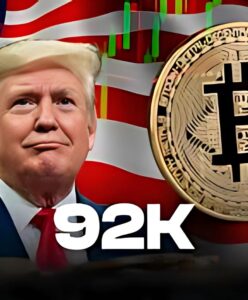Trump Signs Order to Launch US Strategic Bitcoin Reserve
In a move that could change the U.S. government’s stance on digital assets, former President Donald Trump has signed an executive order to create a U.S. Strategic Bitcoin Reserve. This initiative highlights a growing federal interest in cryptocurrency and comes ahead of a scheduled White House meeting with key crypto industry figures.

A New Approach to Crypto Holdings
The reserve will be built using Bitcoin acquired through asset forfeiture cases. According to White House crypto advisor David Sacks, the government plans to hold onto these assets rather than selling them, treating them as a long-term store of value, much like the nation’s gold reserves.
In addition to Bitcoin, the reserve will include Ethereum (ETH), XRP, Solana (SOL), and Cardano (ADA). The announcement led to an immediate spike in the value of these cryptocurrencies, illustrating how government decisions can impact the digital asset market.
How Will This Affect Taxpayers?
While some see this as a step toward government adoption of digital currencies, questions remain about its execution. The order directs the Treasury and Commerce Departments to explore budget-neutral strategies to acquire more Bitcoin, ensuring taxpayers are not directly funding these purchases.
However, skepticism exists. Some critics argue this initiative is simply a repackaging of Bitcoin the government already owns. Others question the lack of clear guidelines on how the reserve will be managed or if it will provide tangible benefits to citizens.
Ethical and Political Concerns Surrounding Trump’s Crypto Initiative
Trump’s strong backing of cryptocurrency has also raised concerns about potential conflicts of interest. His family has been involved in crypto projects, and he holds a stake in World Liberty Financial, a digital asset-based financial company. Some critics believe this initiative could be influenced by personal business interests rather than national strategy. Additionally, concerns have been raised about the transparency of such dealings, with critics arguing that the potential for personal financial gain may undermine the credibility of the policy. As the U.S. government dives deeper into cryptocurrency, questions around ethics and accountability will continue to spark debate.
Market Response and Future Implications of the U.S. Strategic Bitcoin Reserve
Following Sacks’ announcement, Bitcoin’s price initially dropped by more than 5%, falling below $85,000. However, earlier enthusiasm surrounding Trump’s crypto-friendly stance had driven Bitcoin to a record high of $109,071.86 in January.
Regardless of differing opinions, the creation of a U.S. Strategic Bitcoin Reserve marks a major shift in how the government interacts with digital currencies. Whether this will lead to long-term economic advantages or simply serve as a political gesture remains to be seen. Additionally, market analysts continue to debate whether such government-backed initiatives will provide stability or exacerbate volatility in the crypto market, given its inherently speculative nature. As digital currencies become further entrenched in policy discussions, their role in global finance could evolve in unpredictable ways.












